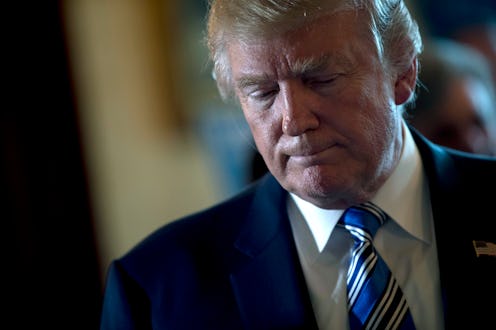News
Will The Senate Still Bother To Vote On The Health Care Bill?

Republican efforts to repeal Obamacare were dealt a potentially fatal blow on Monday, when Republican Sens. Jerry Moran and Mike Lee announced that they can't support the bill in its current form. But will the Senate still vote on health care reform? The legislation is now two votes shy of the minimum threshold needed to pass, so for all intents and purposes, this version of the bill is dead.
From a process standpoint, the decision of whether or not to bring health care up for a vote lies with one man: Senate Majority Leader Mitch McConnell. As of this writing, McConnell hasn't made an announcement one way or the other, so nobody can say for certain whether Obamacare repeal will ever come before the Senate for a vote.
That said, Monday's news isn't necessarily the final death blow to Republicans' efforts to overhaul the health care system. There are still multiple scenarios in which the Senate could end up voting on some health care bill or another — be it this version of the legislation, a tweaked version, or a completely different health care bill altogether.
First of all, there's nothing stopping McConnell from bringing the existing version of the GOP health care bill up for a vote. Generally speaking, though, congressional leaders don't like to put up bills for a vote if they know they'll fail. McConnell already delayed the vote twice because it lacked enough support to pass, and Speaker of the House Paul Ryan scrapped a vote on the original version of the legislation for the same reason.
How about a modified version of the bill? That's a slightly different story, because at least in theory, it's possible that a tweaked version of the legislation could ameliorate some reluctant Republicans' concerns. However, that increasingly looks to be a solely hypothetical possibility, because the fact of the matter is that Senate Republicans are not at all united on how to go about health care reform..
Although only four Republican senators officially announced their opposition to the bill, an additional seven Republicans were publicly uncommitted on it, and had expressed concerns. And this wasn't even the first version of the bill: The Senate completely scrapped the version of the bill passed by the House of Representative for fear that it couldn't pass. Likewise the legislation that passed the was a tweaked version of an initial bill (Ryan canceled a vote on the first version for lack of support).
What all of this shows is that, when it comes to repealing Obamacare, the Republican Party simply isn't in agreement with itself. Although it's still technically possible that there's some narrow approach that would please both the moderate and conservative factions of the Republican Senate caucus, that seems like less and less of a possibility every time the GOP has to rewrite its own bill to please its own members.
The last way in which the Senate might vote on a health care bill is if they propose one that doesn't repeal Obamacare. McConnell himself reportedly floated this possibility earlier in July, telling a Rotary Club audience that "If my side is unable to agree on an adequate replacement, then some kind of action with regard to private health insurance markets must occur."
It's possible, then, that the Senate could vote on a health care bill that only makes minor tweaks to the health care system, as opposed to one that guts the Affordable Care Act. Democratic Senate leader Chuck Schumer has expressed openness to this idea, so it does seem like a real possibility that there could be a bipartisan effort to improve American health care.
Nobody can say for sure how this will turn out. It's entirely possible that McConnell will delay the vote on this bill yet again, or put the bill up for a vote even though it lacks the support to pass, or any number of other things. By all indications, though, it does not look like this version of the health care bill will come up for a vote. Whether a different version will remains to be seen.